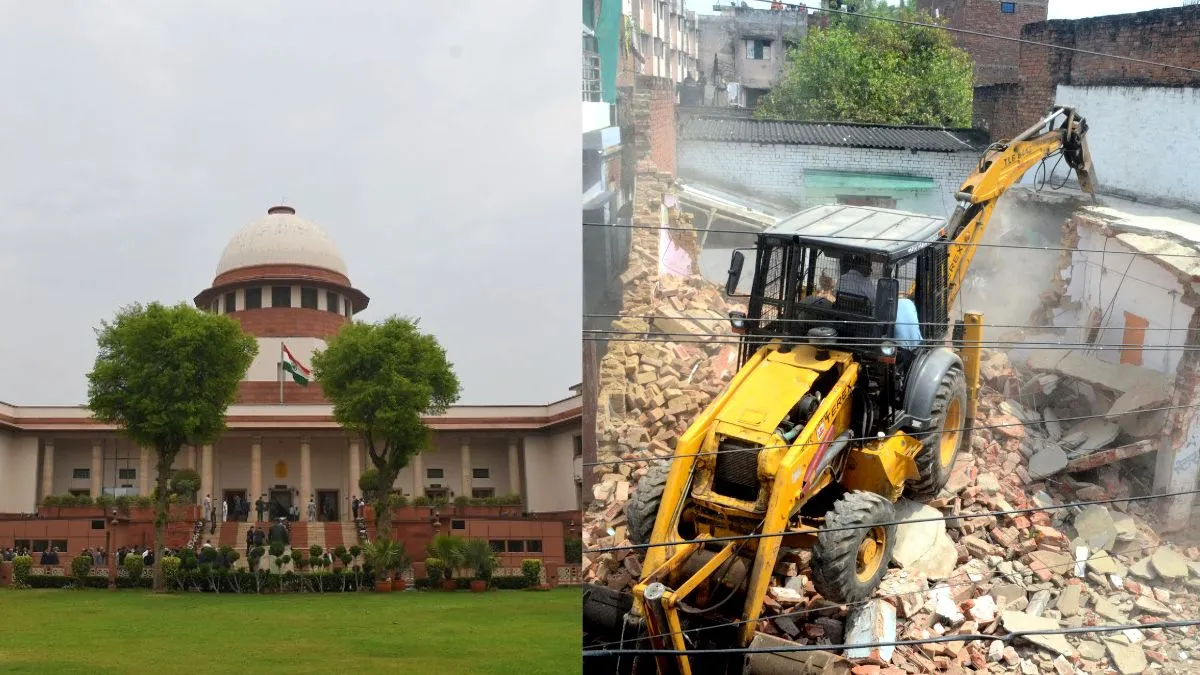- By Nidhi Giri
- Wed, 13 Nov 2024 11:24 AM (IST)
- Source:JND
The Supreme Court on Wednesday issued stringent pan-India guidelines to curb bulldozer action employed by certain states and said the entire process must be videographed and a report of the demolition should be submitted to the district head. The apex court, however, said the new rules won’t be applicable to illegal structures or encroachments on public property such as roads, railway tracks etc.
“No demolition should be carried out without prior show cause notice returnable either in accordance with the time provided in local municipal laws or within 15 days from the date of service, whichever is later,” said Justice BR Gavai said, reading out the guidelines.
Pronouncing its verdict on the batch of pleas seeking to stop authorities’ “bulldozer action" against the accused as a punitive measure, the two-judge bench of Justices BR Gavai and KV Vishwanathan said the executive cannot become judiciary and decide who is guilty.
The SC said any such demolition carried out without permission from the authorities concerned would be considered “arbitrary".
READ MORE: Who Is Ikramuddin Kamil? Taliban’s ‘Consul’ In Mumbai As India-Afghanistan Push To Expand Ties
Justice Gavai said it is the dream of every family to have a house and an important question before the court was whether the Executive should be allowed to take away someone's shelter. "The rule of law is the foundation of a democratic government... the issue relates to fairness in the criminal justice system, which mandates that legal process should not prejudge guilt of accused," the bench said.
"We have considered the rights guaranteed under the Constitution that provide protection to individuals from arbitrary State action. The rule of law provides a framework to make sure individuals know property will not be taken away arbitrarily," it added.
On the separation of powers, the bench said adjudicatory functions are entrusted to the judiciary and the "Executive cannot replace the Judiciary". "We have referred to the doctrine of public trust and public accountability. We have concluded that if Executive demolishes the house of person arbitrarily merely because he is accused, it violates principle of separation of powers," Justice Gavai said.
READ MORE: Massage Gone Wrong! Man Paralysed Seconds After Barber’s Neck Crack Massage | Watch Viral Video
The court said accountability must be fixed on public officials who take law into their hands and act in a high-handed manner. "State and its officials can't take arbitrary and excessive measures. If any officer of the State has abused his power or acted in total arbitrary or malafide manner, he cannot be spared," it added.
Justice Gavai pointed that when a particular structure is chosen for demolition suddenly and similar other properties are not touched, then the presumption could be that the real motive was not razing the illegal structure, but "penalising without trial".
"For an average citizen, construction of a house is the culmination of years of hard work, dreams and aspirations. House embodies collective hope of security and future. If this is taken away, authorities must satisfy it is the only way," the bench said.
The court also questioned if authorities can demolish a house and deprive its residents of shelter if only one person residing there is an accused.


